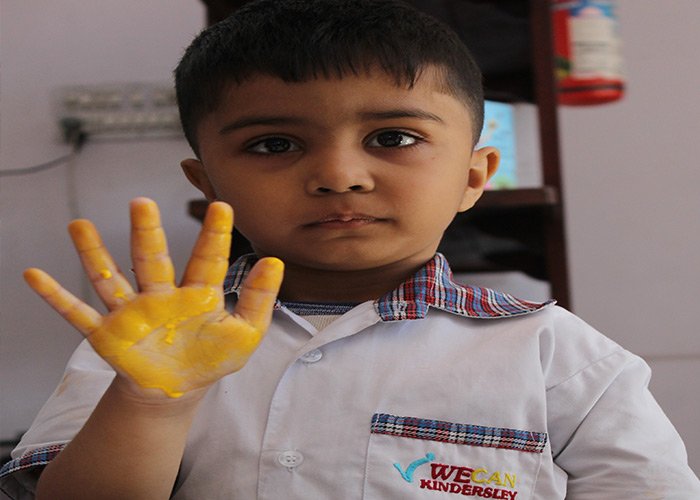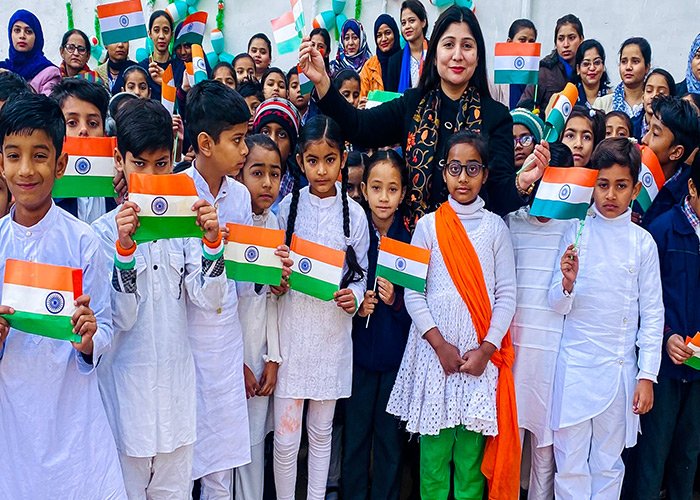Primary Education at WeCan Schools!
A child steps into the primary level of the school from the interesting, fun-filled, and active environment of the pre-primary level. A student is acquainted with the alphabet, numbers, and certain basic concepts. The writing skills are developed from holding a pencil to scribbling sentences. By the time a child enters the primary level, he is trained to read, write and be aware of his surroundings. This transition from pre-primary to primary level is a big leap and an important phase in the life of the child as a student. The faculty of the primary wing believes that children learn best in a nurturing environment-one that is secure, joyful, and intellectually challenging. Updated academic considerations shape decisions about the curriculum, organization, and daily life at school.


WeCan’s primary wing as an educational institute understands and realizes the importance of this transition and so every measure is taken to provide a relaxed, active, and interactive environment to the students. Academics and curricular activities are blended to establish a strong foundation strengthened by clear and transparent concepts. Affirmative and positive feedback is given based on a child’s analysis, efforts, ideas, and accomplishments to help children face challenges with optimism, focus, and determination. This way students develop hope, competence, confidence, and self-esteem.
Curriculum At WeCan Schools, the teachers have created a curriculum centered around language arts, environmental studies, and mathematics in conjunction with music, art, science, library studies, and physical education.


The school offers a curriculum according to the National Education Policy and blends it with innovative techniques to meet global standards. The books selected for every subject go through a rigorous selection procedure. The entire academic team looks into the details of each book including the content, design, life skill activities, exercises, font, and layout before finalizing the books. The entire curriculum is divided in a balanced way over the period of one year keeping in mind the syllabus and the number of teaching days available. Unseen passages, Comprehension, Creative writing, etc. are introduced to enhance the reading, writing, and understanding skills of a student.
Examination forms an integral part of a student’s learning process. The primary level is the introductory level for a student to appear in formative and summative examinations. Periodic assessments, half-yearly, and final examinations are taken in accordance with the guidelines provided by the State Board. Care is taken that exam papers are concept based covering the syllabus and are taken at regular intervals to keep a performance check on the student. The exam papers are designed to cover various types of objective and subjective questions.


Core element The primary level is the first level where a student is introduced to different new ways of depicting answers like diagrams, maps, graphs, etc. It is ensured that students learn the new ways with ease and interest. Problem-solving and number relationships are core areas. Teachers use concrete examples with the students to help them apply mathematical concepts. At all levels, students work on the four major operations in arithmetic, as well as measurement, fractions, two/three-dimensional geometry, analysis, and estimation.
English is a global language and its importance in today’s world is immense. Realizing the same the school takes extra efforts to enable students to understand and communicate confidently in English. English communication, reading, and dramatics are introduced at various levels to achieve this purpose. WeCan has also initiated the ‘I Love Learning English’ campaign in which special assemblies are organized by various primary classes at regular intervals. Parents are invited to attend the same.


Early literacy skills are supported as the children are exposed to a variety of literature. The children are encouraged to keep journals with their own stories or group poems. Display boards in classrooms reflect the varied interests of the children and act as positive reinforcement and encouragement from their peers and teachers. Oral skills form the keystone of learning; through vocabulary games, we combine learning with fun. Every assembly is conducted in English where each participant expresses a love for language through rhymes, reading, dramas, role plays, narration, and many more activities. The school ensures that every student participates in such assemblies.
Educational activities not only make learning interesting but also allow every student to grasp the concept in a simple manner. The curriculum offers many such activities enabling students to exercise their skills. Events and celebrations are organized to form an integral part of the child’s development during school life. Many inter-house activities, debates, and competitions are also conducted for a complete holistic development of a student. The goals of the art curriculum include mastery of skills, personal image making, independence, as well as awareness and respect;> not only for materials but for each other's work.


Classes from I to V fall under the primary level because these classes form the foundation years of a student’s academic journey. Clear concepts, confident personalities, and curious minds are developed through extensive planning and innovative teaching techniques. The school firmly believes in this ideology and religiously follows it to provide quality education. Library, games, and audio-visual periods form a part of the academic timetable.
School is not just a knowledge hub, but it is the place to groom young minds in all spheres. Making friends, cooperating with peers, respecting elders, valuing our culture, and working hard with honesty are some of the values which we try to imbibe in every individual.


Highlights The following formal areas of learning are addressed in a structured manner from Grade I to V
- Phonetics
- Reading
- Language
- Conversation
- Mathematics
- Science
- Social Studies
- The five senses - Listening, Speaking, Writing, Imagining, Sensing
- Health and Nutrition
- Computer
- Moral Values
- Music, Dance, Drama
- Drawing, Art, and Craft

